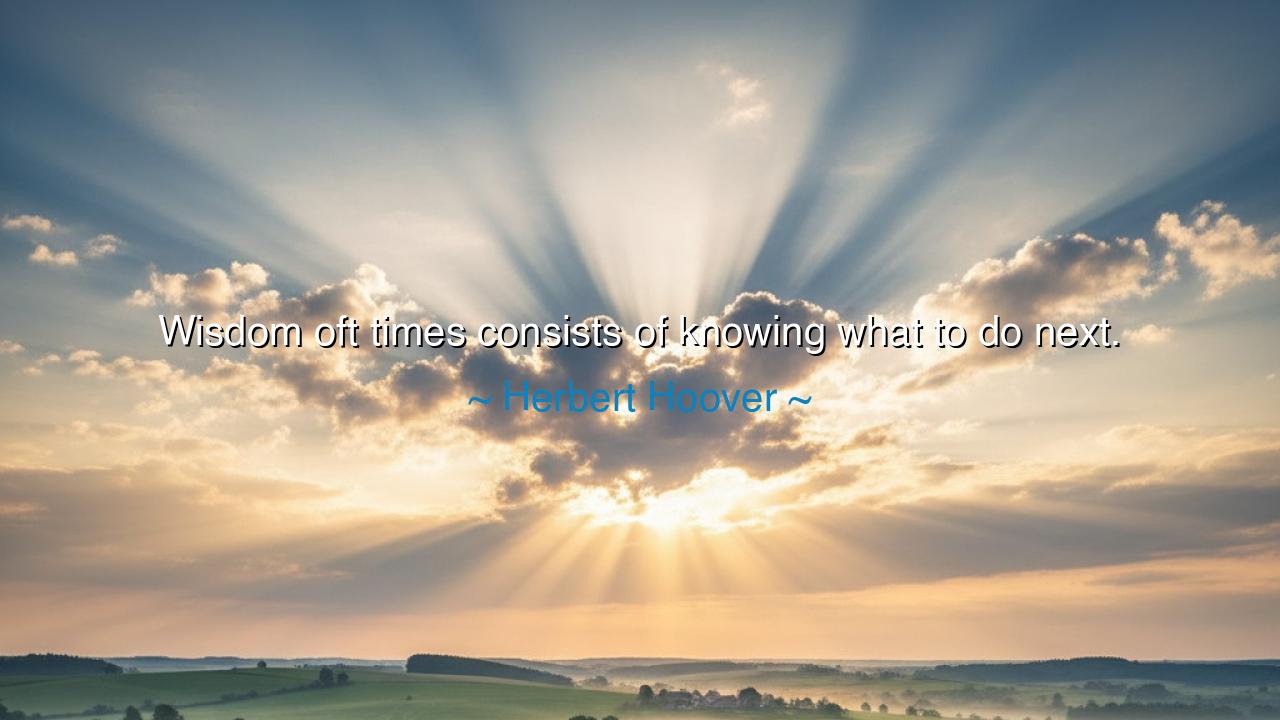
Wisdom oft times consists of knowing what to do next.






The American statesman Herbert Hoover, who bore both triumph and trial in his long life, declared: “Wisdom oft times consists of knowing what to do next.” In this brief saying lies the essence of practical wisdom—not lofty speculation alone, nor endless words, but the ability to see clearly in the moment and act rightly when action is demanded. For life is not lived in theories but in choices, and the soul that hesitates at the crossroads may lose both the path and the prize.
The origin of this insight lies in Hoover’s own journey. Before he became president, he was known as the “Great Humanitarian,” organizing vast relief efforts to feed millions in war-torn Europe. In these moments of crisis, success was not found in books or debate, but in the ability to decide swiftly what must be done next—how to move grain across oceans, how to restore hope to starving people. From such trials arose this truth: that wisdom is not merely knowledge of eternal laws, but also the clarity to guide each step in the face of urgency.
History reveals this lesson in the life of Abraham Lincoln. In the dark days of the Civil War, he was beset by counsel from every side—some urging haste, others delay. What marked his greatness was his instinct to discern what must be done next: to issue the Emancipation Proclamation at the moment when it would strengthen the Union cause, to change generals when failure demanded it, to wait when patience was wiser than rashness. His wisdom was not in knowing every detail of the future, but in discerning the next right act.
The ancients themselves praised this quality. The Greeks called it phronesis, the wisdom of action, the skill of the navigator who cannot calm the sea but can steer the ship through storms. To know the stars is noble, but to turn the rudder at the right moment is survival. So too in life: the wisest are not those who dream endlessly of distant ideals, but those who know what to do next, and who take that step without fear.
Therefore, O seekers of the future, learn this: greatness is not only in vision, but in decision. The wisdom that saves a people, that carries a soul through hardship, lies often in the simple clarity of the next act, chosen with courage and resolve. Do not be paralyzed by the weight of eternity; master the moment before you. For in each “next” lies the seed of destiny, and in each choice well made, the world is quietly transformed.






QTtRAN QUANG TUNG
I really like the simplicity of this quote—it makes wisdom feel accessible. It’s not something mystical or reserved for philosophers; it’s about practical action. But I also find myself wondering, what happens when we *don’t* know what to do next? Does uncertainty mean a lack of wisdom, or is wisdom sometimes knowing when to pause, reflect, or seek guidance? Maybe wisdom isn’t always about action, but also about patience and timing.
DBDiem Bya
Hoover’s statement reminds me that wisdom is often situational—it’s about context, timing, and judgment. It’s easy to analyze things in hindsight, but in the moment, knowing what to do next can be incredibly difficult. I wonder if wisdom is partly about being comfortable with uncertainty, too. How do we train ourselves to make the right next move when there’s no clear path or when every choice carries potential risk?
CTNgo Canh Thien
This quote makes me think about how wisdom isn’t necessarily about deep philosophical thinking but about timing and discernment. The ability to know what to do *next* is so crucial, especially in moments of uncertainty. But how do we cultivate that kind of clarity? Is it intuition, experience, or something we develop through reflection and learning from past mistakes? It feels like wisdom is less about knowing everything and more about acting decisively when it counts.
HTtran ha trang
Herbert Hoover’s quote really highlights the practical side of wisdom—it’s not just about having knowledge, but about applying it effectively in real situations. I find that distinction fascinating. Many people know what’s right or true, but not everyone knows what to *do* in the moment. So, does wisdom come more from experience than from intellect? Can someone truly be wise without having faced difficult, decision-making moments in life?